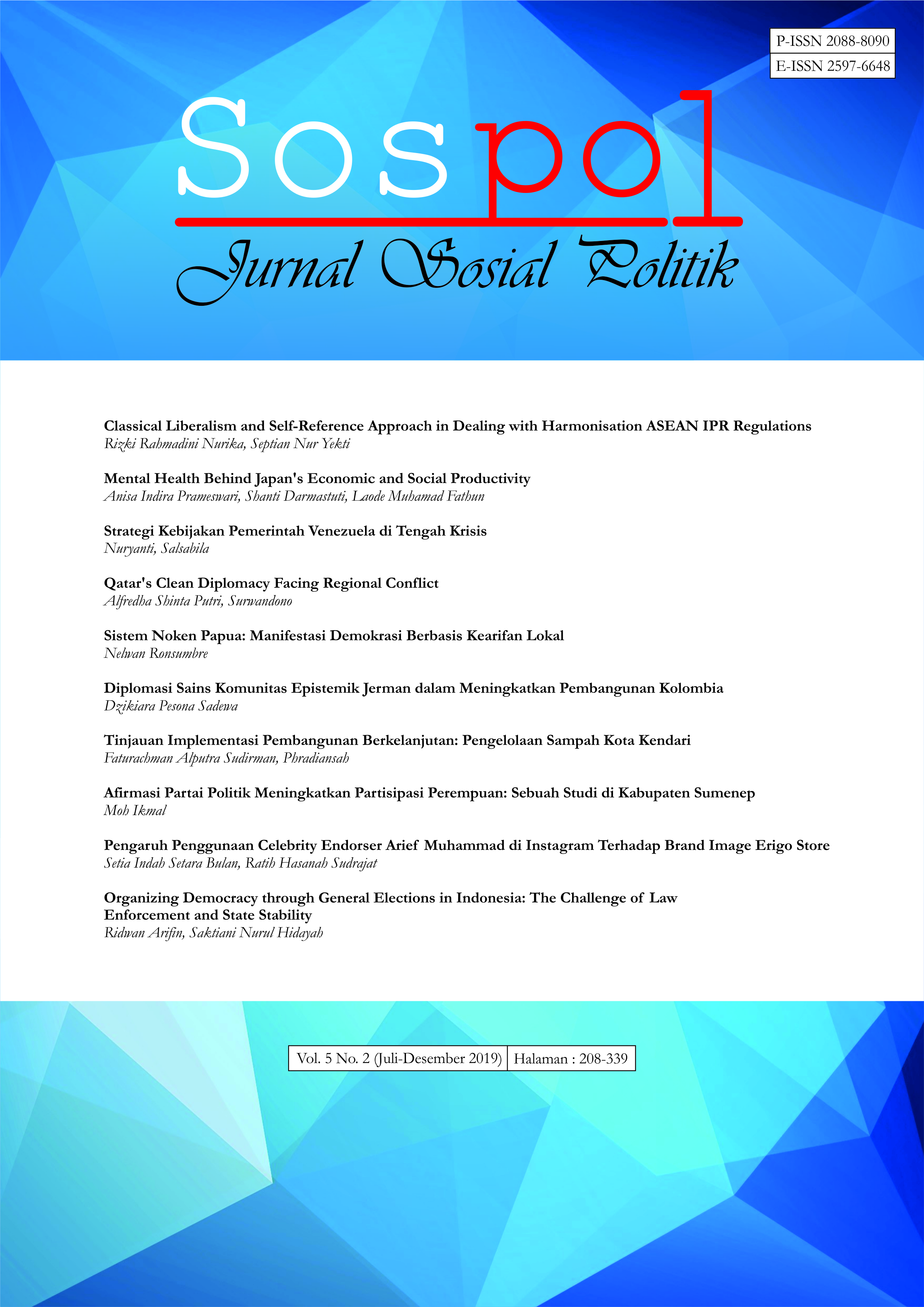Organizing Democracy through General Elections in Indonesia: The Challenge of Law Enforcement and State Stability
DOI:
https://doi.org/10.22219/sospol.v5i2.7670Keywords:
democracy, general elections, law enforcement, state stabilityAbstract
One of the developments in Indonesia's political democracy is marked by the existence of legal framework that state sovereignty belongs to the people and is carried out in accordance with the 1945 Constitution. On the basis of the formulation of leadership succession in the executive and legislative branches it is mandated by Article 22 E paragraph (2). However, in practice the constitutional arrangement in Law Number 42 of 2008 concerning the General Election of the President and Vice President shows that it is inconsistent with statements in the constitution. As stipulated in Article 3 paragraph (5) states that the election of the President and Vice President is held after the election of the DPR, DPD and DPRD. At the end of the Constitutional Court through Decree No. 14/PUU-XI/2013 states that the selection of models is unconstitutional. Based on this assessment the constitutionality of the norm selection method is based on the simultaneous interpretation of the constitution both from the initial intentions and historical interpretations. The simultaneous constitutional electoral plan was called born as an effort to shift the direction of the transition to democracy in a strengthening system so that democratic consolidation of direct democratic practices tends to be transactional, corrupt, manipulative, high cost and to preserve power can be minimized in the practice of constitutional democratic dimensions to understand and sovereign.
Downloads
References
Arrsa, R. (2014). Pemilu Serentak Dan Masa Depan Konsolidasi Demokrasi. Jurnal Konstitusi, 11(3), 515–537.
Creswell, J. W. (2009). Research Design : Qualitative , Quantitative , and Mixed Methods Approaches. 35(2), 2–4.
Fitriana, M. K. (2015). Peranan Politik Hukum Dalam Pembentukan Peraturan Perundang-Undangan Di Indonesia Sebagai Sarana Mewujudkan Tujuan Negara. 1–27.
Huda, K., & Fadhlika, Z. A. (2019). Pemilu Presiden 2019 : Antara Kontestasi Politik dan Persaingan Pemicu Perpecahan Bangsa. 547–562.
Lestari, M., Asikin, Z., & Risnain, M. (2019). Presidential Threshold Concept in the Democratic Perspective in Indonesia. International Journal of Scientific Research and Management, 7(06), 149–150. https://doi.org/10.18535/ijsrm/v7i6.sh01
Mulyadi, D. (2018). Concurrent Regional Elections Phenomenon As a Political Recruitment in Indonesia. Jurnal Dinamika Hukum, 18(1), 87. https://doi.org/10.20884/1.jdh.2018.18.1.843
Mulyadi, D., & Utami, T. K. (2017). The Dispute Settlement Model of Regional Head Election Perspective Theory of Legal System in Indonesia. International Journal of Nusantara Islam, 5(1), 97–106. https://doi.org/10.15575/ijni.v5i1.1054
Nurjaman, A. (2017). Cleavage Agama Di Tingkat Lokal , Indonesia : Identifikasi Partai Tanpa Komitmen Electoral. 3(2), 43–66.
Nurjaman, A. (2018). Masa Depan Faksionalisme Politik Golkar Pasca Orde Baru. 4(2), 34–48.
Octarina, N. F., & Djanggih, H. (2019). Legal Implication of Black Campaigns on The Social Media in The General Election Process. Jurnal Dinamika Hukum, 19(1), 271–282. https://doi.org/10.20884/1.jdh.2019.19.1.2115
Pasaribu, T., Sumadinata, R. W. S., & Muradi, M. (2018). Pemilu Berintegritas (Studi Pendaftaran Pemilih Terhadap Pengguna Surat Keterangan Domisili Dalam Pilkada Samosir Tahun 2015). Journal of Governance, 3(2). https://doi.org/10.31506/jog.v3i2.4427
Prasetyoningsi, N;Wijayanti,; Syaroni, A. & L. (2019). The Implementation of Siyasah Syar’ iyah Principles in The Constitutional Court Decision Regarding to The Simultaneous Election 2019. 7(2), 108–128.
Putra; Ariany; & Syahrizal. (2019). Tata Kelola Verifikasi Partai Politik Peserta Pemilihan Umum Tahun 2019. 9(1), 107–123.
Romadhan; Khanifah; Sihidi; & Kamil. (2019). The Role Of Bossism In Practice Of Gambling Election Of Village Head In Batu City. Web Jurnal Online: Jurnal.Unmuhjember.Ac.Id, 53(9), 1689–1699. https://doi.org/10.1017/CBO9781107415324.004
Solihah, R. (2019). Peluang dan tantangan pemilu serentak 2019 dalam perspektif politik. 3(1), 73–88. https://doi.org/10.14710/jiip.v3i1.3234
Triono. (2019). Menakar Efektivitas Pemilu Serentak 2019. 2(2), 156–164.
Yustikarini, D., Alika, H., & Arifin, R. (2018). Membaca Dinamika Demokrasi dalam Penyelenggaraan Pemilihan Umum di Indonesia. 467–468.
Downloads
Published
How to Cite
Issue
Section
License
Authors who publish with this journal agree to the following terms:
- Authors retain copyright and grant the journal right of first publication with the work simultaneously licensed under a Creative Commons Attribution-ShareAlike 4.0 International License that allows others to share the work with an acknowledgement of the work's authorship and initial publication in this journal.
- Authors are able to enter into separate, additional contractual arrangements for the non-exclusive distribution of the journal's published version of the work (e.g., post it to an institutional repository or publish it in a book), with an acknowledgement of its initial publication in this journal.
- Authors are permitted and encouraged to post their work online (e.g., in institutional repositories or on their website) prior to and during the submission process, as it can lead to productive exchanges, as well as earlier and greater citation of published work (See The Effect of Open Access).

This work is licensed under a Creative Commons Attribution-ShareAlike 4.0 International License.



















